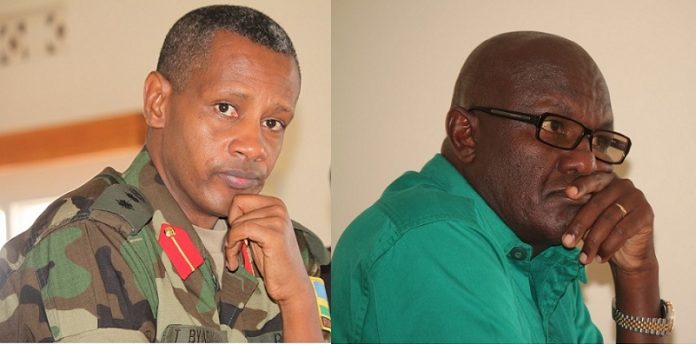By David Himbara
General Frank Rusagara is my brother-in-law but in the broader sense of our Rwandan tradition, he is my younger brother. We lived in the same neighborhood in a Ugandan refugee camp of Nakivale— I am age-mate of his elder brother. Colonel Tom Byabagamba is my younger brother. I hasten to add, however, that I hardly knew Rusagara and Byabagamba. Because of hard lives in refugee camps, people tended to scatter all over the world looking for better opportunities. I ended up in Canada where I lived through the 1970s, 1980s, and the early 1990s.
I came to know Rusagara and Byabagamba better when I moved to Rwanda in 2000–2002, and 2006-January 2010. In both periods, Byabagamba and I worked for the same person — head of state General Paul Kagame. But Byabagamba and me were strictly in different professions and different work. Byabagamba was a soldier in the business of keeping safe the head of the state. I was in the business of reforming government, advising and writing speeches.
What was remarkable to me when I moved to Rwanda is how little I knew about the Rwandan political environment, the ruling party and elites, their experience during the 1990s’ war, and subsequent entry into state power. Neither did I have time to learn. I was consumed by my work that was 24/7. In any event, hardly anyone in Rwanda, including Rusagara and Byabagamba, ever wanted to discuss their days in the bush — so I left that alone. We concentrated on our respective work which was 24/7.
The longer I stayed in Rwanda, however, the more I learned mostly by observing that all was not well. Towards 2009, I realized I did not belong to the Rwandan environment. It was too abusive, with too many unpredictable and unexplained developments, and yes — authoritarianism. I began to realize that I was set in my own ways, preferring a more predictable environment where public servants are not changed every month or year, humiliated, or routinely thrown on the streets and in prison.
Sensing that 2010 elections might bring into the open Rwanda’s violent political culture, I decided to leave the country for good in January 2010. I went back to South Africa where I had lived since 1994. But the killing of Colonel Patrick Karegeya on January 1, 2014, convinced me that South Africa was not safe for an ex-employee of the Rwandan state. I returned to Canada.
When I left Rwanda in January 2010, that was the end of my communication with my family. Even when my mother and my brother died, I could not be part of my grieving family. We lived in two different planets. I did not make any contact with either Rusagara or Byabagamba. Even when Rusagara was transferred to the UK as Rwanda’s Defense Attaché, I never contacted or met him.
Then Rusagara and Byabagamba were arrested and imprisoned in August 2014. I felt guilty that I was somehow responsible for their imprisonment. As we all know, relatives of people who have a falling out with the Rwandan head of state end up in trouble. The opposing argument is that most people who have been victimized by the Rwandan government do not necessarily have relatives outside the country who criticize General Kagame.
Be that as it may, I feel so honoured to be related to these two brave soldiers — Rusagara and Byabagamba. When they finally had their day in court after five years in prison, they were not bitter. On September 13, 2019, when Rusagara and Byabagamba concluded their appeal in court, they were not angry. They stood tall and dignified and shared with the world how they served their country to the best of their ability. Rusagara and Byabagamba perfectly fit the definition of a patriot — a person who vigorously supports his country and is prepared to defend it, no matter what. That is what Rusagara and Byabagamba did for 24 years from 1990 to 2014. They fought for their homeland and the right to reclaim their Rwandanness. Nobody can take that away. Not even the miscarriage of justice these two braves have suffered for five years can erase their patriotism.





























































